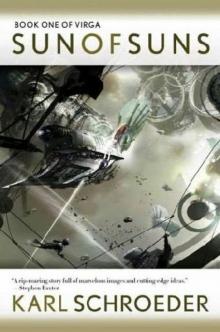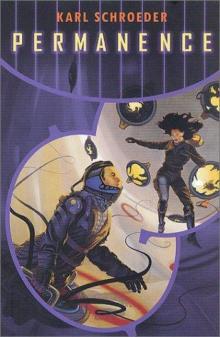- Home
- Karl Schroeder
Ashes of Candesce: Book Five of Virga Page 29
Ashes of Candesce: Book Five of Virga Read online
Page 29
"Ooh," said Inshiri as they hand-walked along a cable to one of the many corridors that opened out of the hangar. "Defections?"
"Well, no, not yet. But let's call them 'reliable signs of unrest.'" He pointed down the corridor. "My office is this way."
"Oh, in a minute, thank you," said Inshiri. "One of your men can direct me. I just have some orders for this lot." She nodded to her servants, as well as Jacoby's other men who trailed her and the general secretary.
"As you will." He disappeared down the corridor. Inshiri turned to Jacoby.
"Your men stay behind," she said levelly.
"What? But I need them to run my communications net--" But Inshiri was shaking her head.
"I've coopted it, I'm afraid. Had to kill a few of your men to do it thoroughly." She laughed at the expression on his face. "Oh, don't act as if you weren't expecting this, cousin. You've had far too much autonomy, and I need you close and controlled for now. Your network is now my network, and you are useful because you know its logistics better than anyone. You can have it back--and I'll throw in a country or two--when we're done."
He glowered at her. "Not a good way to guarantee my loyalty."
"Loyalty? Don't make me laugh. You'd have made your move against me sooner or later." She smiled sweetly and flew off after the general secretary.
Antaea met Jacoby's eye, and smiled.
He pulled himself straight and frowned at her with all the dignity of his years. "It's all right," he said. "I did see this coming." Turning to his men he said, "I'll see you all at Rendezvous Point B. But leave the luggage."
"And what did she mean with that crack about giving you a country?" Antaea continued. "The plan is to tune down Candesce and give the people of Virga more technological capacity. Not to take over the world."
Jacoby shrugged. "Your plan, my plan ... everybody's got plans. Yours is also the Guard's plan, so I wouldn't worry about it too much. Inshiri talks a good line, but even she can't control your people. Now, who do I call to help get our bags to our cabins? It'll be a day or two before we rendezvous with the outsiders."
She watched him go, troubled, and uncomfortably aware that some of the airmen were watching her. They know who I am. Well, let them stare. Winter wraith; traitor; turncoat. She'd played them all, and the stares had always been the same.
But as she hauled her own luggage and it began to slowly move, she couldn't help but think about Inshiri's jabs and insults. The woman liked to keep people off balance; you could never tell when she was telling the truth or lying. What if she really did have some way of capturing Candesce? --Via the outsiders, perhaps?
Antaea would have to watch Ferance; though as she traversed the endless corridors of the giant battleship, the vast scale and obvious power of the vessel led her to concede that Jacoby was probably right.
Nothing inside Virga could successfully oppose the Virga Home Guard--not even its own rebellious Last Line. And surely not Inshiri Ferance.
22
TEN YEARS BEFORE, a single ship could have slipped into Candesce on any given night. An entire flotilla could have--and hundreds of ships did, every time the sun of suns shuttered its blazing eyes and retreated into sleep. The first visitors were always the scavengers: well-insulated, mirror-clad, and fast, they ventured in even before the last of Candesce's fusion engines had gone out. Braving incandescent air, they competed to find castoff and broken parts from Candesce's intimidating furnaces. The scavengers believed from firsthand experience that Candesce deliberately seeded its trash with intact machinery, for they often found vital components for the construction of suns among the flotsam. They snapped up this bounty, fought amongst themselves for it, and the winners retreated back to the principalities ahead of the dawn, to sell their prizes.
After them came the funeral ships. They were not here to pick up, but to drop off. Bodies from all over Virga made their final journey here, to be consigned to the dark, hot air by loved ones or the trusted funerary castes of a hundred nations. As Candesce began to rouse itself, these last ships departed, leaving roses and songbooks, the precious treasures of the beloved dead, and thousands of white-shrouded, silent figures hanging suspended in the air. Those who looked back as the sun of suns awoke might see light well past the throng, lighting the paper wings they wore. Dawn was an inferno of angels.
So it had been for centuries. But ever since the outage, the Last Line of the Virga Home Guard had tightened their defenses. They had long believed the last key to Candesce lost; so there was never any reason to board and inspect the funeral ships, nor to stop the scavengers from approaching the mysterious, closed blockhouses that nestled in Candesce's heart. Now that the key was loose again, everyone was suspect--even ships from other arms of the Guard.
Last Line ships were the first in at dusk, and the last out at dawn. They watched everyone, and their terrifying precipice moths clamped their talons onto ships at random, prying back their hulls to glare suspiciously at their cargoes. So when a small flotilla of First Line ships approached Candesce, they were stopped and boarded.
Since even before the grand colloquy, they'd all known this was going to happen. The First Line and Last Line had fallen out over what to do with Candesce. The First Line had the key, for it had been a First Line precipice moth that had taken it into Candesce to begin with, and when it burst forth again it had taken it to its masters at the rim of the world.
So those who boarded, and those who were boarded, had known for many months that their initially formal meeting would dissolve into gunfire and swordplay. They'd known, they'd even planned for it; but none of them really believed it until the bodies were in the air and blood was raining into the darkening skies. And the reaction that rippled back into both camps was shock, and outrage, and immediate mobilization.
* * *
SOMEBODY RAPPED ON the door to Leal's stateroom. She jerked and floated several feet away from the sleeping bag strapped to the wall. "Come in!"
The iron hatchway creaked open and Piero Harper stuck his head around it. "Ma'am, I'm sorry if I'm--"
"No, no, Piero, I was hoping to see you. And I can't sleep anyway." He glanced sympathetically at the little stateroom's porthole, where brilliant light was flooding in. It was nominally the night shift, but they were passing by some sun or other. "Oh, it's not that," Leal confessed. "It's the vibration." She put her hand to the wall, and felt an intensification of the throbbing from the ship's distant engines.
She didn't add that this stateroom reminded her too much of the cell she'd been stuck into aboard Eustace Loll's ship, back before they'd all crashed in Aethyr.
"But look at you!" she said. "You've fattened up nicely." Then, more seriously: "I can't believe your wife let you go again."
Piero grimaced. "She insisted. 'Those people'd be dead without you!' she said. 'You got to keep them safe!'" He grinned. "Truth to tell, I think she has her eye on the military pension I get for signing up."
"But you get to work with Hayden again?" He nodded.
"And you're a great lady now, as all knew you would be."
"Oh, I don't know about that. Nobody's telling me anything lately." No that she'd expected them to. She'd fulfilled her own mission by delivering the emissary's message, and now she was just so much dead weight. Leal didn't know why she'd insisted on coming along--the truth was, she would rather have been anywhere than here. But they were calling her the Herald these days; airmen got out of her way as she drifted down the corridors; and, apparently, even Admiral Chaison Fanning could not refuse her wishes.
A shadow crossed the porthole, and they both looked up. The sky outside Leal's porthole was full of ships; she'd never seen such an armada, and the thought that her message had launched it filled her with sorrow. "I just wish none of it had ever happened," she murmured.
"Ah, ma'am," said Piero. "This isn't your fault."
The light from the porthole shifted again; but this time, it brightened. Leal assumed one of the local suns had emerged from behi
nd a cloud. Then it brightened again. And again.
Sirens went off all over the ship. She exchanged a wide-eyed look with Piero; then they both jumped to the porthole and looked out, ears touching.
All across the sky, suns were coming on. She knew the fleet was approaching the principalities, and in this spherical region around the sun of suns, some countries perversely lit their lamps in a rotation opposite to Candesce's. They had banished night entirely and grew crops and ran their industries twenty-four hours a day. Most of the principalities didn't even have their own suns; because of their proximity to Candesce, they didn't need their own lights. So Leal had been told. Yet incandescent pinpricks of light were appearing above, below, and to all sides--everywhere, even in those nations that were not supposed to have them.
She pushed open the bulletproof circle of glass, and a chaos of horns, sirens, and bells filled the stateroom. Warm, moist air puffed in and lifted her hair. She could feel the heat of all those suns on her face, and the feeling was so unfamiliar and hostile that she retreated into the shade of the room.
"Lady Fanning's list," said Piero. She shook her head at him, not comprehending.
"Couriers were sent to every country," he said, "all carrying the list, and the words of our treaty. People know which of their neighbors have sided with the invaders, and who's with us. They're choosing sides. They're moving!"
The drone of the ship's engines changed, increasing in pitch. "Is the whole world at war?" Leal asked, as the aft wall drifted up and became a tentative floor.
Piero didn't answer, but she knew the truth. Neighbor was turning against neighbor everywhere, all at once. Treaties a thousand years old were breaking, former friends were shooting one another in the airways between their ancestral homes. The majestic, intricate, and ancient systems of the principalities were being undone in minutes.
She covered her eyes against the glorious light--and it came to her that one man might understand the unraveling going on. Wherever Chaison Fanning was, he held in his mind a tactical map of the world. He knew where the fleets were, who had what ships and how fast they were. Even now his semaphore men must be sending orders to dozens of receivers, turning chaos and random movement into the coordinated flocking of a thousand ships. But had he anticipated this terrible light, the banishing of night in the unveiling of secret suns?
Piero came to stand with her, and she held on to his arm for comfort. But dear as he was, he wasn't Keir, and his presence wasn't enough to keep at bay a growing sense of despair.
* * *
DISTANT SHEETS OF rain trailed like coy veils over the towers and bridges of the city of Brink, uncovering and hiding its vistas and architectural surprises, now here, now there. Where they had passed, the balconies and rearing walls gleamed like oil on water, presenting myriad pastel colors to the eye. The scents of rain and wet stone hung in the warm air, hinting at the possibility of life.
Despite his haste, the sight stopped Keir in his tracks. He had never seen Brink like this--never even guessed that its black minarets might hide such delicate hues. He couldn't even tell which of those distant pillared cathedrals was Complication Hall, because he had always found it in the past by the light from its windows. Now he saw that there was not one, nor two or even a dozen, but many such halls, some within hailing distance of the Renaissance's home.
He could also see bomb damage--lots of it. After enduring brutal avalanches for centuries, Brink was not easily erased; nonetheless, whole precincts of the city were flattened rubble-slopes now.
As he shaded his eyes against the blazing sun to try to make out details, somebody bumped Keir's shoulder from behind. "You're blocking the way!"
"Sorry." People, and stranger things, were pouring out of the wide doorway behind him. Twenty minutes ago, he had been packed into the tiny transfer room with them, enduring the sudden shift from Virga's now-familiar weightlessness to the gravity of Brink. No one had spoken during that short trip, and many of the humans, freshly recruited from Chaison Fanning's navy, had cowered in awe and fear of the morphonts. Now they were bursting into the glowing air of a new world, and everybody was talking at once.
He had to smile as he strolled after them. Brink was new to him, too, though in retrospect it was unsurprising that the Renaissance's allies would tow one of Aethyr's hovering suns up the long slopes to light the city. Those sheets of rain must come from melting glaciers high above, which meant that the avalance problem must be far worse these days. Sure enough, when he looked for it, he could see chunks of ice and snow piled around the bases of nearly every tower.
Better get inside, then. He hurried across the long span of bridge and into the lofting corridors of the metropoloid. Here was military order, of a sort: work gangs hauling strange devices up from the Hall and their various strange births in the Edisonians; soldiers hefting unfamiliar weapons; lines of men being debriefed by pacing officers.
Fanning had wasted no time in establishing a beachhead in Brink; in fact, he had clearly sent a sizable armada there after the abortive attack on Serenity. Keir had known a little about this activity, which was how he'd been able to get himself on board one of the fast courier sloops that Fanning had moored above the palace during the grand colloquy. Keir had talked to some of the pilots about what they might expect to find in Serenity and Brink. But he'd had no idea the operation was being conducted on this scale.
Lightning flickered through the windows and heads turned. "They're at it again," someone muttered. As he walked Keir counted half-consciously, waiting for the thunder to follow the lightning, but it didn't come. Just more insistent flashes.
He stopped a bare-chested navvy who was carrying a large steel cylinder. "What's that?" Keir pointed to the window.
"It's the Enemy, in't," said the airman. "Battle to end all battles going on, or so they say. They tryin' to get here, our boys holdin' em off."
Not lightning, then. Nukes, or laser fire, and probably hundreds of kilometers away. Keir frowned and hurried on.
He took the last set of stairs down to the Hall two steps at a time. In his imagination were all the ways that the virtuals could obliterate Aethyr, or Virga. They could accelerate an asteroid from the far side of the solar system, shoot it through both worlds at a thousand kilometers a second, and let the shock waves transform them into expanding spheres of gas ... then simply move in and harvest Candesce like the seed in a smashed fruit. They could stand off and peel off the world's skin with terawatt lasers, then aim them through the holes at every sun and city inside. They need not be polite.
He could guess what stopped them. They had no idea how Candesce worked. They did not know what it was capable of. And so far, they had done everything in their power to avoid waking it up. But how long would that caution continue?
The tall doors to the Hall were guarded by a detachment of men in Slipstream uniforms. One put out his hand as Keir made to enter. "You're not on our list."
"I live here."
The man looked Keir up and down, and he realized he was still wearing his now-rumpled dress attire from the colloquy. "Try another one," said the doorman.
"But--" He caught himself as he felt an odd but familiar feeling. It was scry, the whole cloud of relationships and nonverbal political fencing that had once been as intimate to him as his own breath. He couldn't help but smile as the network lit up with glyphs and emoticons of astonishment: they'd felt him log in.
There was something else, though, another familiar presence even more intimate than scry. And now his smile widened, alarming the doorman. "One second," said Keir; and he held up his arms, palms out.
A hundred dragonflies rustled out of the shadows, rising like the hood of a cobra to hover above him like some strange halo. The guards stepped back, swearing and fingering their unfamiliar new weapons. Suddenly Keir could see, in a way he hadn't been able to in months. He closed his own eyes in bliss.
"Let him in." He'd brought his second body over from where it had been languishing in a closet i
n the Hall's foyer. The guards were even more startled by its appearance, for of course it looked like a younger version of Keir. It was waving to him from the Hall behind them, so they fell back and Keir walked past them with a confident nod--and into the arms of friends and comrades he hadn't properly spoken to or even recognized since his de-indexing.
Maerta came running. "Keir, oh, Keir!" She flung her arms around him and he hugged her fiercely. "You're--are you--"
"I'm whole," he said as he squeezed her tightly. "I remember everything. Everything."
She broke away, troubled. "Even why you did it?" He nodded. "We sent Gallard to find you," she said. "Is he--?" But it would be obvious to all of them that he wasn't here. There was no sign of him in scry.
Keir shook his head. "You didn't send him," he said. "He manipulated you into choosing him. It was his mission to find me."
"Mission?" She shook her head, uncomprehending.
"I'll tell you everything," he said, "but not here." The Hall was a chaos of steaming, stinking manufactories and running soldiers. "Let's find somewhere quiet ... with a window."
* * *
MAERTA AND A few others sat with him in a once-familiar boardroom now flooded with sunlight. The rest were listening in through scry. Keir sat in the sun, remembering the skies of Revelation, then sighed and told them the story. He began with his adventures inside Virga, meeting Antaea Argyre and Jacoby Sarto in that other lost city, and their flight from the knife-balls.
He told them about the glory of Virgan skies, of how Slipstream had welled into view over days as they approached it, like the opening eye of some god of the dawn. How its vast sphere of sunlit air had reached out to encompass their ship, bringing with it the visions of farms and towns, flying people and flocking birds. He described the astonishing ring-shaped city of Rush, and the mad Fannings and their baroque admiralty.

 Ventus
Ventus Sun of Suns v-1
Sun of Suns v-1 Ashes of Candesce: Book Five of Virga
Ashes of Candesce: Book Five of Virga Queen of Candesce v-2
Queen of Candesce v-2 Lady of Mazes
Lady of Mazes Permanence
Permanence